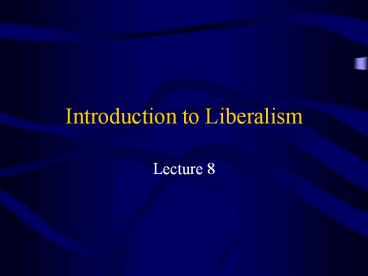Introduction to Liberalism - PowerPoint PPT Presentation
1 / 16
Title:
Introduction to Liberalism
Description:
Each year between 1945 and 1988 9 wars with more than 100,000 killed were in progress ... Republic of Congo, Sudan, Somalia. Africa. Source: Joshua Goldstein. 2003. ... – PowerPoint PPT presentation
Number of Views:18
Avg rating:3.0/5.0
Title: Introduction to Liberalism
1
Introduction to Liberalism
- Lecture 8
2
War in the Contemporary State System
- The Culture of Death.
- Boutros Boutros-Ghali
- (Former Secretary-General of the UN)
3
How Frequent?
- Each year between 1945 and 1988 9 wars with more
than 100,000 killed were in progress
4
What Type of War?
- 1989-1998
- 192 Nation States in existence (average)
- 107 civil wars were begun in this period
- 10 of these civil wars were internationalized
- In 1999, 31 wars underway
5
Where in the World?
- 9 out of every 10 wars take place in the
Developing World
6
Wars in Progress, April 2002
Africa Rwanda, Burundi, Uganda, Dem. Republic of Congo, Sudan, Somalia
South Asia Afghanistan, Sri Lanka, India, Burma, Indonesia, Philippines
Middle East Algeria, Turkey, Iraq, Israel-Palestine
Russia-E. Europe Tajikistan/Kyrgyzstan, Russia (Chechnya), Georgia
Latin America Colombia, Peru
No. America, Western Europe, Japan/Pacific None
Source Joshua Goldstein. 2003. International
Relations, 5th edition (New York Longman), page
211.
7
Question of the Month
- Peace and Stability in the Advanced
Industrialized World. - War and Instability in Much of the Developing
World. - Why?
8
Liberalism and International Politics
- Liberalism A Global Society Can Produce Peace
in International Politics. - Liberal Theories of International Politics Have
their Roots in Classical Political Theory - Particularly Important is Immanuel Kants Essay
Perpetual Peace (1795) - (also John Locke, Hugo Grotius Adam Smith
Richard Cobden Woodrow Wilson).
- Central Beliefs
- Humans Are Corrupted By SocietyNo Such Thing as
an Inherently Bad Person or an Inherently
Aggressive Country. - Anarchy is the Corruptive Force in International
Politics. - Humans Can Improve their Condition By Reforming
Political Institutions. - Countries Can Make War Less Likely By Reducing
Corruptive Force of Anarchy.
9
The 3 Pillars of Liberalism in International
Politics
- Democracy
- Economic Interdependence
- International Institutions
10
The Democratic Peace Democracies Do Not Fight
Wars Against Other Democracies.
- Cultural and Norm-Based Explanations
- Practice of Peaceful Conflict Resolution Within
Democracies Spills into Relations Between
Democracies. - Respect Right of Self-Determination, Cultural
Constraints Against Violence.
- Institution-Based Explanations
- Elections and Other Checks and Balances Make
Governments in Democratic Societies Less Able to
Use Force. - To Use Force, Govt Must Persuade
- Legislature
- Bureaucracy
- Public Opinion
- Constraints Make it Difficult to Use Force
Against Democracies
11
Economic Interdependence
- International Trade and Investment Creates a High
Level of Economic Interdependence. - Economic Interdependence Causes Governments To
Redefine their Interests in a Way that Makes War
Less Likely. - Too Busy Making Money to Fight
- War Too Costly in Economic Disruption
- The Greater is Economic Interdependence, the Less
Likely is War. - Economic Interdependence or Prosperity?
12
International Institutions
- Provide Political Framework for Peaceful
Resolution of Conflict. - Collective Rule Enforcement
- Alter Governments Interests
- Make Them Less Insecure
- Make Them Less Prone to Militarize Disputes
- Can Provide Information About Government
Behavior.
13
Three Interwoven Strands
- The Three Pillars are Complements, not
Alternatives. - A Global Society Can Emerge From a Dense Network
of Economic Relationships Among Democratic
Governments that Interact Within a Heavily
Institutionalized International System. - This Global Society Makes War Less Likely by
- Providing Fewer Reasons to Fight
- Raising the Cost of Fighting
- Providing Alternative Means for Conflict
Resolution.
14
Liberalism and Life in the West
- All Countries are Democratic.
- A High Degree of Economic Integration and
Prosperity. (Average Income is 26,440) - Interaction Among these Countries Takes Place in
Highly Institutionalized International
Environment. - A Liberal Peace?
15
Liberalism and Life in the Rest of the World
- Non-Democratic or, where Democratic, New
Democracies. - Less Economic Integration, More Poverty. (Average
Income Ranges from 420 to 4,870) - Interactions Take Place Within Weak Political
Institutions, International and Domestic. - Lots of War.
16
A Roadmap
- The Tragedy of International Politics the
Liberal Vision. - The Role of International Organizations
- Making Sense of Peace in the West Realists
versus Liberals. - Making Sense of War in the Rest of the World
- Ethnic Conflict
- Focus on Africa
- Can anything be done?











![❤[PDF]⚡ Woke: An Evangelical Guide to Postmodernism, Liberalism, Critical Race Theory, PowerPoint PPT Presentation](https://s3.amazonaws.com/images.powershow.com/10071885.th0.jpg?_=202407041212)



















